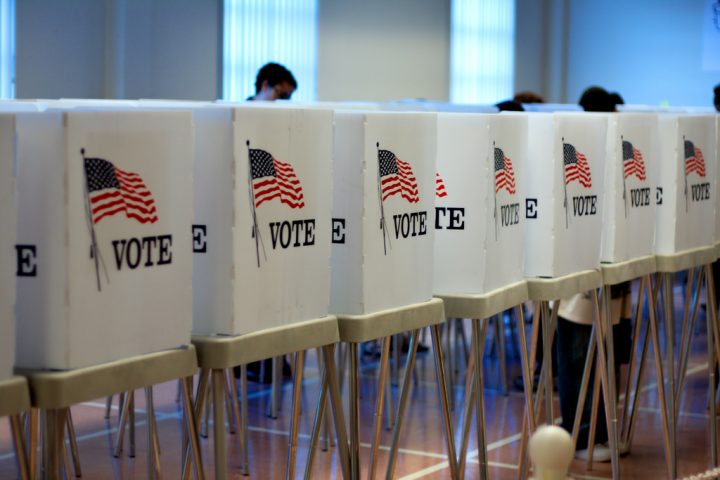It’s Political Campaign Crunch Time
21 ways to win your political campaign in the next 21 days.
This is it – three weeks before Election Day and now things are getting serious. In most states, ballots are already being cast. Your campaign is in crunch time – and you are asking the question – “what do I need to do to win my political campaign?”
The political staff at SpeakEasy Political – along with our sister company, SpeakEasy Political (mail), and parent company, Storefront Political Media (consulting) – have all chipped in to create this list, “21 ways to win your political campaign.” Here you go:
1. Don’t forget the obvious – political campaigns are won by talking to voters, not a few insiders.
You can tell if a campaign is winning or losing after about 20 minutes in a campaign headquarters. In a losing political campaign, staff are talking to each other. In a winning campaign, they are talking to voters, or donors, or reporters or someone who can actually help them win. In all but the largest campaigns – there is still time to talk, text, walk and meet enough voters to make a difference. Study after study shows that the number one way you win campaigns is to talk personally with voters.
2. Political candidates and campaigns still have time to raise money – so get going.
Over the years we’ve kept track of hundreds of political campaigns – and our data indicates that if you are working hard and have any kind of chance to win, you might expect to raise 25% of your total budget in the last three weeks. That means, don’t give up. You can, and should, keep your fundraising going. You should actually be increasing your fundraising time. The number one predictor of whether or not someone is going to give you money is if that person has already donated to you. That means start “resoliciting” right now and after thanking every donor for giving again – ask them, do they know anyone else you should call for help?
3. Voters Are Online Right Now Searching for Information.
In our own political opinion surveys, we see that over 33 percent of voters report they use search engines to figure out how to vote in every election. We found that 80 percent of voters say they have gone online to find information about an election. Since the people searching to figure out how to vote are, almost by definition, the persuadable voters – then you must pay attention to your digital game. You have just a few weeks now to get your Search Engine Optimization (SEO) right. Have your campaign spend a few hours tonight (you can do it after voters have gone to bed) making sure you are following the basics of good SEO. Has every site that can link to you already linked to you and, most importantly, is there good “keyword rich” text on your website. If, for example, you are running Measure A – make sure there is a strong “Question and Answer” section on your website with headlines like “Who Supports Measure A on the 2018 ballot?” with compelling answers to the key questions. If your website does not have a lot of traffic it might not be “crawled” by Google frequently – use your Google dashboard tools to manually request a crawl so the information is indexed by Google.
4. Use what’s free for your campaign.
Almost every state has a number of websites and services that list political candidate information – and give you the ability to share your website, which will in turn help increase your site’s search ranking. Groups like VotersEdge.com list candidate information that many voters use for research. Even Facebook is now letting political candidates record short videos on their campaigns. Many local newspapers publish questionnaires from campaigns and ballot measures. Make a list of all the places you can disseminate information on your campaign for free.
5. Earn your media before you buy it.
Getting good press isn’t exactly free – you have to earn it. But it matters. Your local TV station, newspapers, journalists and blogs probably all want to cover this election – so make it easy for them. Ask someone from your campaign to help put together a camera-friendly event that captures your message quickly. Are you running to improve the schools? Gather 50 teachers and parents in front of an underperforming school and announce your plan to improve education. Remember – the media is just waking up now to the election – and looking for an angle. Just because they have ignored you all year doesn’t mean they are going to ignore you in the next three weeks. Make it easy for them.
6. Activate your political allies.
Voters are much more likely to believe and act on information that comes from trusted sources. Are you endorsed by a local union? Remind them to include your name on their mailing to members. Ask them to host a phone bank. Has a local neighborhood group endorsed you? Ask them to phone, text, and canvass their neighborhood with that message. The more local and specific – the better.
7. Get ready to be attacked by your political opponents.
Tonight (again after the voters have gone to bed) sit down and write out every possible attack and summarize your clear, non-defensive, response. The number one way voters process attacks are your responses to them. Do you seem defensive? Are you sweating or screaming? Keep your cool. The best way to stay cool is to be ready.
8. Write your email schedule.
Email has actually not been proven to be a particularly effective tool to persuade voters – but it is an absolutely vital way to activate your own supporters. In 21 days, you should be sending seven or eight emails to supporters reminding them about precinct walks, phone banks, and fundraisers. If voters have opted in to your lists, make sure they are getting 2-3 GOTV reminders, before Election Day and on Election Day.
9. Make some (short) political campaign videos.
Video dominates social media – and you need to create your own campaign videos before Election Day. Shorter is better. So, if there are 4-5 issues you are running on – create 4-5 “to camera” videos on each of these topics – and post them in sequence on Facebook and other social media. Keep it short.
10. Think about your targeted political direct mail.
There is still time to get into the mailbox – and in most small races and even a few big ones -political direct mail is still a priority. Mail lets you target just your swing voters. Try, if you can, to hit your target audience at least twice and hopefully three times – so you need to get going. Need help? Our service www.SpeakEasyPolitical.com is designed to help candidates get quality mail produced at a discount.
11. Use targeted digital media for your political campaign.
Political digital media is exploding because it is low-cost, targetable, and very fast to deploy. It is also “Direct Response,” meaning you can ask voters to join, give and pledge with just one click. If you are not using targeted digital media yet, you are at a severe disadvantage. We can also help here with www.SpeakEasyDigitalAds.com – which allows Democratic candidates and causes to deploy highly targeted digital media quickly, and with all the advantages the big campaigns enjoy, like access to premium inventory and the big ad exchanges. We’ve created a quick e-book to run you through the basics of political digital media – you can download it here.
12. Review your research and data.
What is working? Are you getting much better feedback from women than men? Then make sure to finish calling all the women before you start in again with the men. Is one town doing better than another – hit the best town first. Is one online ad doing better than the others? Prioritize that ad. At this point, your campaign should have gathered a great deal of data – even if you haven’t been thinking about it much. Take a moment to review it – and use that data to optimize your efforts going forward.
13. Start texting voters.
It works. And it is getting easier and easier. Just remember, try to be informative, not spammy. For example – if you just published a great op/ed – ask people to read it. “Hope you can take a minute to review Tom’s article on improving local schools in the Tribune before you vote.” Certainly, information about voting is also a proven tool. “The deadline for absentee ballots is today – please don’t forget to mail your ballot!” We use Hustle or Relay but there are other good services also.
14. Use peer-to-peer political tools.
Rigorous studies on what works in politics and what does not work shows that peer-to-peer outreach is much more powerful than traditional mass media. That’s when one of your friends says “I’m voting for Kate because she’s the only candidate with a plan to improve our schools – I hope you will learn more about her at (your website). We use Voter Circle – but there are many similar services.
15. Start a pledge to vote drive.
You have probably noticed, but in this hyper-partisan moment in US politics many campaigns focus more on persuading their voters to actually vote rather than trying to change minds. While this focus on the “base” is something we should all debate after November, you can’t ignore this reality in your campaign. It might be a lot easier to persuade a supporter who would not otherwise have voted to go to the polls than it is to persuade a consistent voter to change their mind. Practically, this means that when you do identify a voter – ask them to make a pledge or a plan to vote. Studies show getting voters to make these kinds of commitments or plans helps motivate voting.
16. Update your voter lists.
In most places and races, voters who register in the last months have a very high turnout. Don’t miss them because your lists are out of date. Check with your team and make sure you are updating your voter lists regularly.
17. Fundraise some more – use the two-week deadline and one-week deadline as well as deadlines to create political materials.
Can we say it enough – money comes in at the end. Political donors respond to deadlines and practical needs. Need to print more lawn signs? Ask for help. Need to fund that last-minute mailer or digital buy? Ask your donors to sponsor that – and let them know exactly what the money is going for. Please don’t be shy – if your campaign is important, you will ask your friends and supporters to join your cause, including as donors. And remember – donors don’t think it is “too late” to give, so don’t think it is “too late” to ask.
18. You call it a yard sign, we call it “social norming”.
For years people in our political consulting business made fun of window signs and yard signs and other “visibility” efforts because they were not targeted. Well, then the smart people at the Analyst Institute studied the effect of visibility and what do you know – it worked. It is a theory called “Social Norming.” That means we take clues from our neighbors and we have an unconscious bias toward adhering to the social norm. Show your voters what the norm is by getting your signs up in yards and windows now.
19. GOTV is not a one-day affair – start now.
It is the most important day of the political campaign – Election Day. But you need to invest many days in getting ready. Make sure you are organizing right now to staff your phone banks on Tuesday – and your reminder calls on Saturday and Sunday before Election Day – and your early morning walks, and your visibility, and your “text-a-thons,” and all the ways your campaign will be Getting out the Vote on Tuesday.
20. Pay attention to all the political campaign fundamentals.
Many candidates and campaign managers think there is a secret to victory. They are wrong. Everybody knows how to win – work hard, ask every voter you can reach, thank everyone who says yes, fundraise consistently, fund a threshold of paid media and most of all – deliver a compelling message that you believe in passionately. Need a reminder – we tried to write it all down in our Guide for First Time Candidates – you can download that here.
21. Remember why you’re running.
You are going to get tired – and so is everyone around you. It is a lot easier to get up an hour early and work that extra hour late if you remember what it is all about. Remind yourself – and everyone else. Make it a cause, not just a campaign.
And to everyone in the next 21-days – Good Campaigning and Good luck to you!




